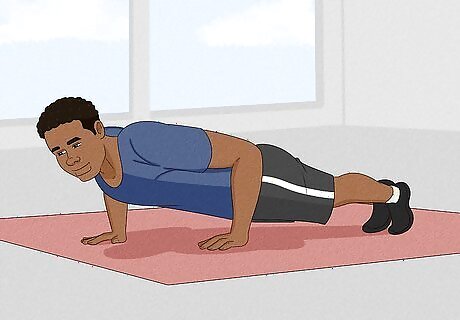
views
X
Trustworthy Source
National Institute of Mental Health
Informational website from U.S. government focused on the understanding and treatment of mental illness.
Go to source
Constant worrying is a habit that can be hard to break. The good news is, there are many things you can do to stop the pattern of excess worry and live a happier life.
Changing your Behaviors

Postpone worrying. If worrying is interfering with your day-to-day life and you can't stop, try putting off your worries until later. Give yourself permission to worry, but only during certain times of the day. For example, you might set aside a half an hour after dinner each day for worrying. If a worry pops into your head at any other time, you can recognize it, but just tell yourself "I'll think about that later." This technique lets you set your worries aside for awhile so you can get through your day.

Write your worries down. A study from the University of Chicago shows that writing your worries down can help you let go of them. Writing your worries down can help make the problem feel more manageable. This strategy works well with postponing your worries. Making note of them on the list can help you feel like you can let your worries go until "worry time." Then, when it is worry time, you can just go over your list.

Talk about your worries. Talking through your worries can also help. It can put things in perspective and help you get to the root of your issues. Be aware though that too much of this can be hard for your friends. If this is an ongoing issue, consider seeing a counselor or other mental health professional.

Spend less time on the computer. Recent studies have shown that people who rely on computers and other devices for social interaction suffer from more anxiety. Consider cutting down on your screen time to help with excess worrying. Social media use in particular may lead to conflict, and comparison of yourself with others. It can also make it harder to relax. All this can promote worry. Switching off your devices several times a day can give you more control over your relationship with technology.

Keep your hands busy. Doing something with your hands, such as knitting or using "worry beads" may help reduce stress and worry. Recent studies by the Medical Research Council show that keeping your hands busy during troubling events may reduce how much they bother you later. The research has not discovered any impact on worries about things that have already happened. But, if you are in a troubling situation, do something patterned and repetitive with your hands. It might reduce worries about it later.

Get plenty of exercise. Exercising is not just good for your body. It is also an effective way to decrease the anxiety that leads to worry. Regular exercise may be more effective than prescription drugs for decreasing your anxiety levels. Research on animals shows that exercise increases levels of serotonin. This is a brain chemical that relieves anxiety and makes you feel happier.

Take deep breaths. Taking slow deep breaths activates the vagus nerve, which can help reduce stress and worry. Some people recommend taking "4-7-8" breaths when worried. To do this, exhale completely through your mouth. Then, inhale through your nose, counting to four as you do so. Hold your breath for seven seconds. Finally, exhale through your mouth, counting to eight as you do so.

Try meditation. Medical research shows that meditating affects the brain in ways that decrease worrying. If you are a persistent worrier learning how to meditate may be very helpful. Meditation increases activity in the Ventromedial prefrontal cortex, the part of the brain that controls worrying. It also grounds you in the present moment. Meditation, done right, should make it impossible to think about future problems, at least while you are meditating.

Try aromatherapy. Recent medical studies support the claim that the scents of certain essential oils can reduce stress and worry. In particular, the smell of grapefruit was shown to be effective in this area. Essential oils and other aromatherapy products are available in many health stores and natural food shops. You can also try just smelling a grapefruit!
Changing your Thinking

Recognize your worries and move on. Sometimes, trying to suppress your worries seems to just make them worse. So, don't try to ignore your worries. When they pop into your head, accept them, but then try to move on. It is hard to avoid thinking about something you are actively trying not to think about. Writing your worries down or setting a designated "worry time" can be very helpful in letting them pass.

Categorize and challenge your worries. When you do think about your worries, a good way to process them is to categorize them. Specifically, for each try to determine the following: Is this problem one you can solve, or not? If a worry is about a problem you have the power to fix, the best remedy may be to start fixing it. Once you have a plan to fix the problem, you will be less worried. If you cannot solve the problem, accept it, work through it and move on. Is this worry about something that is likely, or unlikely, to happen? A worry about something that is likely to happen may indeed be troubling. On the other hand, if you decide it is not likely to occur, this can be a first step in letting that worry go. Is this worry about something about something really bad, or not? Think about what it is that you are worried might happen. If it did occur, how bad would it really be? Most things we worry about aren't actually that terrible. If you decide it wouldn't be a catastrophe, this can help you let go. That's doubly true if it also isn't that likely to happen!

Make your worries boring. If there is a specific worry that bothers you often, you can try to make it boring, so your brain will return to it less often. Do this by repeating it in your head again and again for several minutes. For example, if you worry that you might get in a car accident, repeat in your head the words "I might get in a car accident, I might get in a car accident." In the short term, this may increase you anxiety. But, after a little while, the words will lose their power and become boring to you. Chances are, they'll stop popping up in your mind so often after that.

Accept uncertainty and imperfection. An important change in your thinking is accepting that life is unpredictable and imperfect. This is key to stopping worries in the long term. A good place to start this change is with a writing exercise. Jot down your answers to these questions: Is it possible to be certain about everything that might happen? In what way is needing certainty helpful to you? Do you tend to predict bad things will happen just because you are uncertain? Is that reasonable? Can you live with the possibility that a bad thing might happen, if that outcome is not likely? When worries come to mind, try to remind yourself of your answers to these questions.

Think about social influences. Emotions can be contagious. If you spend a lot of time with other worriers, or people who make you anxious, you may want to reconsider how much time you are spending with those people. Spend some time thinking about the people you spend time with, and how they affect you. It may even be helpful to keep a "worry diary" that tracks when you worry most. If you find that it's right after seeing a certain person, you may decided you need to spend less time with him or her. Or, you might decide there are certain topics you don't wish to discuss with this person any more. Changing your social circle can change the way you think.

Live in the moment. Most worries rise from fears about the future, rather than our immediate surroundings. Focusing on you surroundings and the moment you are experiencing can be a good way to shut down worries. Some people recommend a "stop, look, listen" technique. In this approach, when you are worrying, stop and recognize the worry. Take a deep breath. Then, look at your surroundings. Spend five minutes focusing on the details of the world around you. As you do so, speak calmly and reassure yourself that things will work out.




















Comments
0 comment